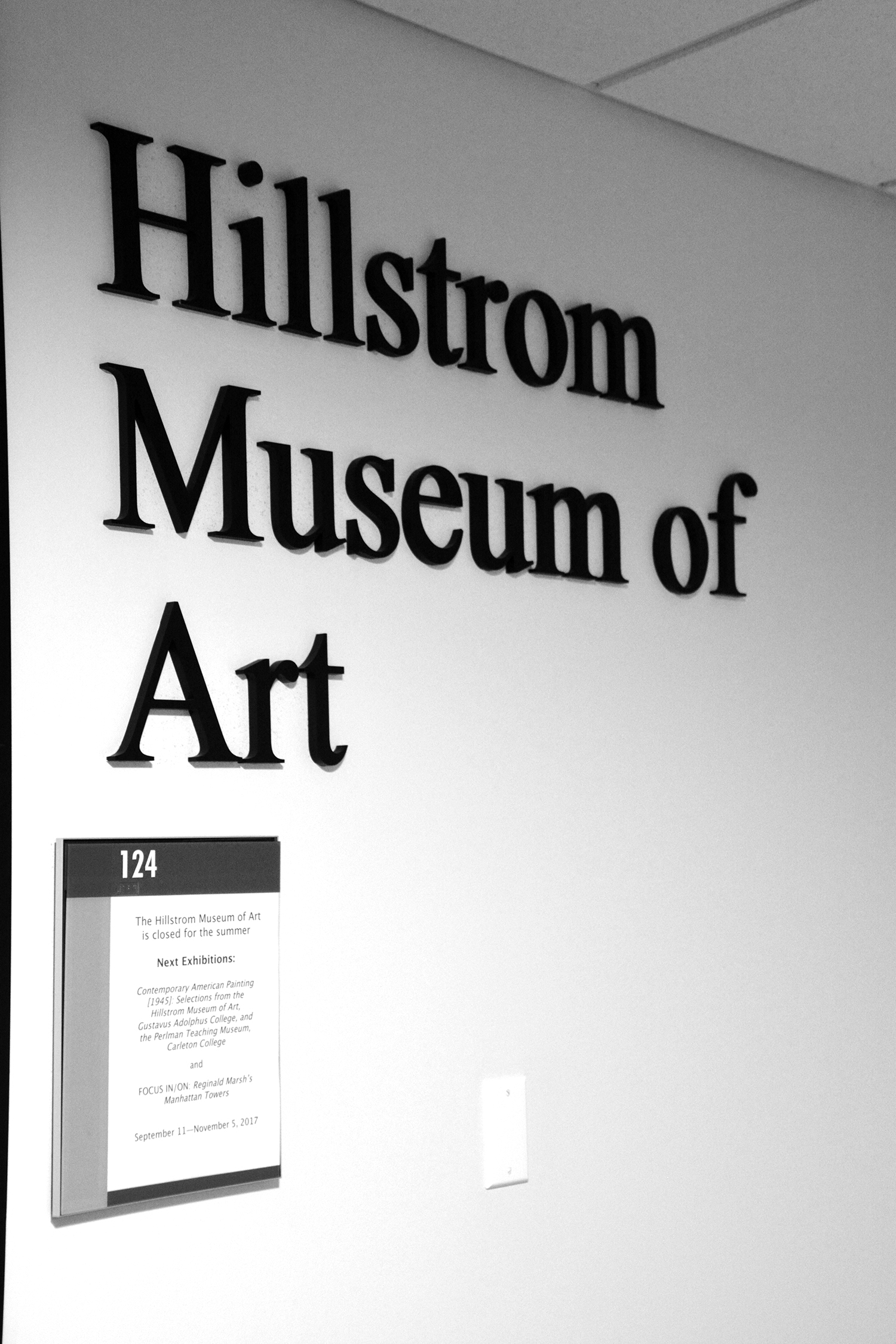From September 10 to November 4, 2018, The Hillstrom Museum of Art (HMA) presents two exhibits to the public.
One of them is FOCUS IN/ON, a collaborative art project between the HMA and a Gustavus faculty member featuring Minnesota artist Cameron Booth’s Toilers and 10 AM, Zero One, and Other Settings, a collection of paintings by Brooklyn Artist Tony Martin.
As introduced by the Hilltrom Museum brochure, “FOCUS IN/ON is a program of the Hillstrom Museum of Art that engages the expertise of Gustavus Adolphus College community members across the curriculum in a collaborative, detailed consideration of a particular artwork from the Hillstrom collection.
This fall, the Hillstrom Museum chose a landscape painting by Dean of Minnesota Cameron Booth (1892-1990) as the focus for the FOCUS IN/ON program.
According to Donald Myers, Director of the Hillstrom Museum and instructor in the Art and Art History Department, Booth was nationally and internationally recognized as a landscapist, including what the artist termed “barnyard landscapes.”
As a supporter of Minnesota arts and artists, the namesake of the Hillstrom Museum, Reverend Richard L. Hillstrom collected several of Booth’s artworks and later donated them to the museum.
Booth’s Toilers was donated to the Museum in 2002.
The oil painting dating around 1925 depicts five raspberry farmers making contact with the ground alongside a horse.
This landscape is known to be set in Hopkins Minnesota where raspberries are the main crop.
The FOCUS IN/ON brochure features an article that provides background as well as geological insights regarding the artwork, written by Myers in collaboration with Laura Triplett, Associate Professor and Chair in the Geology Department and Associate Professor in the Environmental Studies Programs.
The article analyzes the human and animal contact with soil in the painting and raises awareness about the importance of soil to the human/animal body, the mind, and the changing global climate.
“When first contemplating Booth’s painting Toilers, one empathizes with the human subjects and their toil. One can also be mindful of the frame of reference: that the first response to a scene is to consider what humans do with soil. Then one can stop into a different frame of reference, and think about what is smaller and bigger, and younger and far older.
The connections between soil and human health, long-term food production and climate change invite creative and urgent consideration,” Myers and Triplett wrote.
Besides the FOCUS IN/ON project, the Hillstrom Museum is pleased to present an exhibition of paintings and drawings by Brooklyn artist Tony Martin.
Introducing Martin’s work, Myers quotes French collector and jurist Catherine Kessedjan, saying; “His paintings may or may not be peopled, may evoke natural or manmade worlds, may even blend the two in some startling manner. Their single fixity occurs in the way they beckon the viewer not to look at, but instead to look into.”The assignment was in order to connect a piece of artwork with a class concept, challenging the interdisciplinary abilities of her students.
Indeed, the exhibit stands out with its pastel color scheme, offering a sense continuity and harmony despite the paintings’ distinctive subjects.
This color scheme has drawn First-year Art History and Studio Art Major Emily Burt’s attention.
She shared that she saw the colors through the glass windows and decided to come in and see the work.
Most intriguing to Burt was the oil piece Out of the Blue, which the first-year describes as a surprising contrast with skillful use of the rule of thirds.
Being a frequent visitor of the museum, Nicole Goebel, Benefits Specialist from Human Resources, stopped by the museum as she “[tries] to stop by once for every exhibit. [She] love[s] arts and like[s] to be inspired. [She has] a feel-good sensation whenever [she comes] down here.”
Goebel’s favorite piece from Martin’s work is the oil on linen piece Scherzo, in which the hidden human face and body and ladder trigger Goebel to contemplate the dynamic and direction between the vague human figure and the concrete object.
Goebel also shared: “A close second would be [Cascade, World View, and Assembly]. I appreciate the lighting and layout of these three. They look more intriguing from afar and under this lighting.”
The three oil pieces painted in 2015 were arranged next to each other on the same wall.
Their similar palettes and subjects retain a sense of agreement and flow on a single platform with uniform lighting.
The HMA will be hosting a free opening reception with artist’s gallery talk on Monday, September 17, 7 to 9 p.m.
Martin will briefly present and share his perspective with the Gustavus Adolphus College community. Everyone is welcomed to attend this free event.
